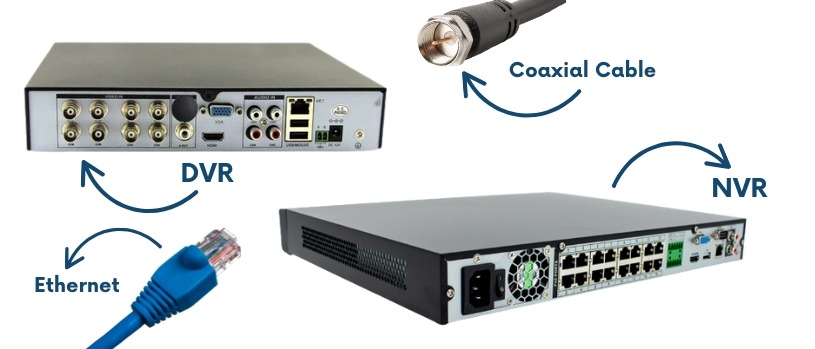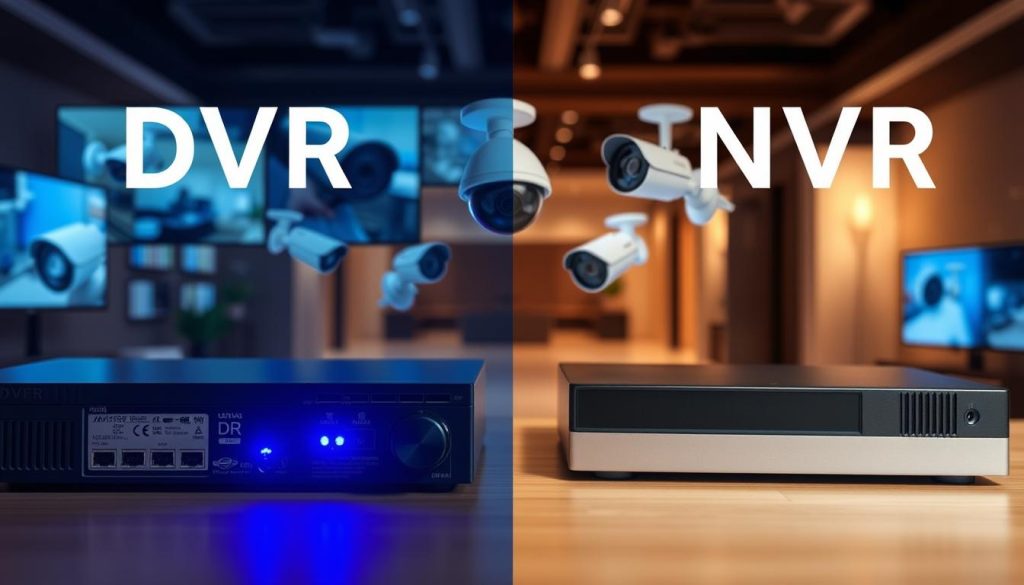If you want to keep your home or office safe, you might hear about DVR and NVR. These are two types of systems used for video surveillance. But what is the difference between DVR and NVR? Which one should you choose? This article will explain these terms in simple words. You will learn how they work and what makes them different.

Credit: www.astfast.com
What is a DVR?
DVR stands for Digital Video Recorder. It is a device that records video from security cameras. DVR systems use analog cameras. These cameras send video signals through wires to the DVR box.
The DVR then changes the video into a digital format. It stores the video on a hard drive inside the DVR. You can watch the video later on a screen or computer.
How Does A Dvr Work?
- Cameras connect to DVR using coaxial cables.
- DVR processes and records video on its hard drive.
- You can view live or recorded video from DVR.
DVRs are often used with older cameras. They are common in many homes and businesses. The system is simple and easy to set up.
What is an NVR?
NVR means Network Video Recorder. It is a device that records video from IP cameras. IP cameras send video through a network or internet.
The NVR receives video digitally. It saves the video on its internal hard drive. You can watch videos live or later through a computer or phone.
How Does An Nvr Work?
- IP cameras connect to NVR via a network cable or Wi-Fi.
- NVR records video directly from cameras in digital form.
- You can access the video from anywhere using the internet.
NVR systems are newer and more advanced than DVRs. They work well with high-quality cameras. Many people use NVR for modern security setups.
Main Differences Between DVR and NVR
Now that you know what DVR and NVR are, let’s look at their key differences.
| Feature | DVR | NVR |
|---|---|---|
| Type of Cameras | Analog cameras | IP cameras |
| Video Quality | Lower resolution | Higher resolution |
| Connection | Cameras connect with coaxial cables | Cameras connect via network cables or Wi-Fi |
| Installation | More wiring and cables needed | Less wiring, easier to install |
| Cost | Usually cheaper | Tends to be more expensive |
| Video Processing | Processed by DVR device | Processed by IP cameras before NVR |
| Remote Access | Limited options | Easy to access remotely |
Which One Should You Choose?
Choosing between DVR and NVR depends on your needs and budget. Here are some tips to help you decide.
Choose Dvr If:
- You have older analog cameras already.
- You want a lower cost solution.
- You do not need very high video quality.
- You prefer a simple system with wired cameras.
Choose Nvr If:
- You want better video quality (HD or 4K).
- You want to use wireless IP cameras.
- You want easy remote access from phone or computer.
- You want a system that is easier to install and expand.
Advantages of DVR Systems
- Lower price for basic security needs.
- Works well with existing analog cameras.
- Simple to set up in small places.
- Reliable video recording without internet.
Advantages of NVR Systems
- High-quality video with clear images.
- Wireless camera options reduce cables.
- Easy to watch videos from anywhere.
- Flexible system that can grow with your needs.
Common Uses of DVR and NVR
Both DVR and NVR systems protect homes and businesses. But they suit different setups.
| Use | DVR | NVR |
|---|---|---|
| Home Security | Good for small homes with wired cameras | Best for large homes with many cameras |
| Business Security | Works for small shops with older cameras | Great for modern offices and big buildings |
| Outdoor Monitoring | Reliable for fixed camera locations | Good for flexible camera placement |
| Remote Viewing | Limited, needs extra setup | Easy with apps and internet |
How to Install DVR and NVR Systems
Installing both systems is not very hard. But there are small differences.
Installing A Dvr System
- Place the DVR near your monitor or TV.
- Connect analog cameras with coaxial cables to DVR.
- Connect DVR to monitor or TV for viewing.
- Plug DVR into power and turn it on.
- Set up recording settings using DVR menu.
Installing An Nvr System
- Place the NVR near your router or network switch.
- Connect IP cameras to network using cables or Wi-Fi.
- Connect NVR to monitor or TV for live viewing.
- Power on the NVR and cameras.
- Use NVR software to add cameras and adjust settings.

Credit: www.edviston.com
Frequently Asked Questions
What Is The Main Difference Between Dvr And Nvr Systems?
DVR records analog video from cameras, while NVR records digital video over a network.
Which System Offers Better Video Quality, Dvr Or Nvr?
NVR usually provides higher video quality due to digital signals and IP cameras.
Can I Use Existing Analog Cameras With Nvr?
No, NVR requires IP cameras, unlike DVR which supports analog cameras.
Is Nvr Easier To Install Than Dvr?
NVR often is easier since cameras connect via network cables, needing less wiring.
Conclusion
DVR and NVR are both useful for video security. DVR works with older analog cameras and uses coax cables. NVR works with newer IP cameras and uses a network connection.
Your choice depends on what cameras you have, your budget, and your needs. If you want simple and cheap, DVR is good. If you want better quality and easy remote access, choose NVR.
Now you know the basic difference between DVR and NVR. This will help you pick the right system for your security.